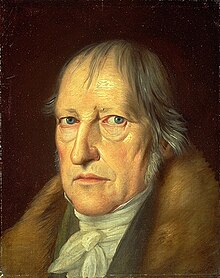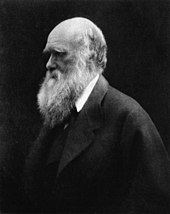Hegel
 |
| G.W.F. Hegel 1831 iamge wikimedia |
In addition to Classification (Aristotle) both scientists give crucial significance to processes that take place in time. The dialectic process itself was more important to Marx than to Darwin. This is because Marx was like Hegel greatly interested in practical political situations, tensions in society and its dialectics. In the background of Hegel's processes is French Revolution that he closely followed and that changed everything.
For Darwin the processes that create layered structures and logical trees was highly significant and as a result he found the continuity in the history of life forms, the Tree of Life (1837).
Darwin
 |
| Charles Darwin 1868 image wikimedia |
Darwin set natural selection in the center of the time bound processes that create species. We can see this already in the name of his book that revolutionaized Western world view and man's understanding of himself
On the Origin of Species by Means of Natural Selection, or the Preservation of Favoured Races in the Struggle for Life.
Oxford 1859
Marx
 |
| Karl Marx 1882 kuva wikimedia |
Das Kapital, Kritik der politischen Ökonomie Vol I
Hamburg 1867
After the death of Marx in 1883 Friedrich Engels published volumes II (1885) and III (1894) in his name.
Definitions
Darwinist is a representative of Evolutionary Biology for whom natural selection is the key in explaining origins of species in nature.
Marxist is a student of human society for whom capital is the key in explaining the fundamental structures and evolution of humanity.
While Natural Sciences and Social Sciences are evolving along the growth of knowledge there are still scholars whose work reflects the fundamental principles on these two human geniuses. Because of the common deep roots of the two thinkers it is only natural that there are Biologists who represent both Marxist and Darwinist views in the manner of Stephen Jay Gould and Richard Lewontin.
Darwinist student of Evolutionary Biology thus sets his or her explanation in the mold of natural selection. As soon as a theory has been presented that explains evolution in terms of survival of the fittest it is acceptable as a scientific theory, a hypothesis, even without any actual evidence for such a struggle. "We are not dogmatic about natural selection" they may say "but no better explanation has been found to the origins of species". Let the search for better explanations continue!
Marxist student of society uses the ownership structures, hierarchies of power and layered class structures of the society as key tools in his or her research in Sociology, Anthropology, Ethnography, Archaeology and other field of research of humans as social animals.
Academic freedom of the modern scholar!
Evolutionary Biologist who is free of the heavy heritage of Darwinism examines discoveries, observes nature and closely follows the research in other related fields, such as Ecology or Genetics in trying to understand the evolution of life on planet Earth. Natural selection is an important but by no means the only criterion for formulating scientifically acceptable theories.
No comments:
Post a Comment